CIA Sponsored Terror, Civil Liberties, Extraordinary Rendition, Habeas Corpus, Human Rights, Iraq Veterans, Iraq War, Military Tribunal, Supreme Court, Surveillance, Targeting Muslims, Truth to Power
Podcast: Play in new window | Download
Updates:
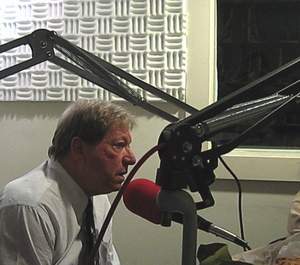

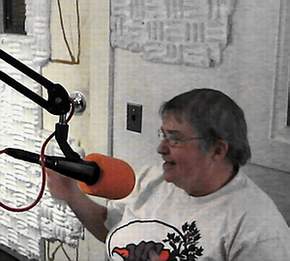
Federal Appeals Court Overturns Two Terrorist Convictions
The 2nd U.S. Circuit Court of Appeals ruled that Sheik Mohammed Ali Al Moayad and Mohammed Mohsen Zayed, convicted of supporting terrorists, can have new trials. The men were convicted in federal court in Brooklyn after a six week trial in early 2005 on charges of conspiring to support Al Qaida and Hamas.
National Lawyers Guild Lawyer, Robert Boyle: This case involved an FBI sting operation where the FBI and the Dept of Justice lured Sheik Mohammed Ali Al Moayad and Mohammed Mohsen Zayed from their native Yemen to Germany.
- They were lured on the promise (…and this was an FBI informant that told them this) that they would provide hundreds of thousands of dollars to Al Moayad’s charitable organizations. The issue was entrapment – set up by the FBI.
- The Sheik went to Germany arrested there in 2003 after meetings with the informant -all recorded. He was brought to trial in Brooklyn but imprisoned in a Florence, Colorado supermax prison.
- The trial judge allowed the government to introduce a host of prejudicial and irrelevant evidence.
- Robert Boyle – “Its rare that they find the cumulative prejudicial evidence as grounds for reversal. This decision is gratifying and unique, its rare to get a reversal in a case where there is alleged terrorism.”
- Extremely similar to Lynne Stewart’s case, if you don’t have direct evidence, prejudice the jury. Raise the spectre of Osama Bin Laden and you hope that the jury overlooks the weaknesses of the government’s case and convicts.
Guest – Lynne Stewart, has also helped set up the Muslim Innocence Project for Muslims caught in similar entrapment.
Guest – Robert Boyle, a national lawyers guild attorney who represented Sheik Mohammed Ali Al Moayad and former civil rights lawyer Lynne Stewart who tells us why this brings other issues to light in her case.
—

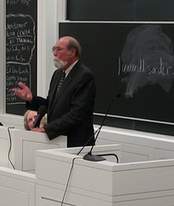

Luis Posada Carriles: A Tribunal
We hear a speech from Wayne Smith, Senior Fellow, Center for International Policy, he was among three speakers. We e will hear Brian Becker, Director of the A.N.S.W.E.R. Coalition in the weeks to come.
Wayne Smith addressed the failure of the United States, specifically the Bush family to prosecute Luis Posada Carriles on charges of terrorism. The failure to charge Posada with terrorism is an open violation of the Resolution 1373 of the UN Security Council. A resolution George Bush pushed through on the days following the attacks on 9/11.
—
—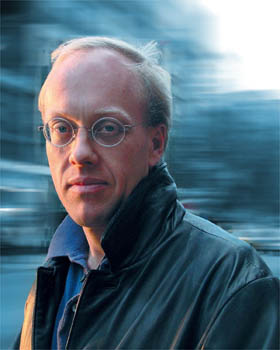


Collateral Damage : Chris Hedges
Author, journalist Chris Hedges exposes the dark violence deep within the ranks of the Iraq War. The type of violence and eyewitness accounts you don’t hear about in the media. His book pulls together the 50 stories from by combat veterans as they describe the day to day carnage.
Chris Hedges:
- We wanted to give people a window into the sheer terror that has been visited on Iraqi civilians.
- Convoys have to keep moving: Running over children. If an IED goes off, soldiers lay down withering suppressive fire.
- The Sunnis are building a powerful force and will soon unleash a civil war
- Barack Obama speaks in the same toxic language of war bequeathed to us by the Bush Administration. He wants to expand the war in Afghanistan, he talks about leaving behind troops in the green zone and the super bases and fighting terrorism.
- We have no rights as citizens of this country to debate the terms of this occupation, in post Nuremberg terms this war is a criminal war of aggression.
- Resistance. We find our spiritual worth in our ability to resist and to take moral stance n0 matter how lonely.
Guest – Chris Hedges, author of many books specializing in American and Middle Eastern politics and society. He spent nearly two decades as a foreign correspondent in Central America, the Middle East, Africa and the Balkans and right now, he’s a senior fellow at The Nation Institue in New York City and a lecturer in the Council of the Humanities.
—————————————————————————————————
CIA Sponsored Terror, Civil Liberties, Guantanamo, Habeas Corpus, Human Rights, Truth to Power
Podcast: Play in new window | Download
Updates:



(Encore Interview) Economics Professor Rick Wolff: The Capitalist Crisis
In this interview Professor Rick Wolff focuses on the larger issues beyond finance such as banking, money lending and credit, he says it was a problem in the making for the last 30 years. He describes historic underlying causes such as the end of the wage increase back in 1970. From 1820-1970 the American economy delivered a rising standard of living, wages went up every decade in that time and they used that money to buy more things.
In the last 30 years the wages in the United States did not go up. In order to keep buying things, people worked more hours and borrowed money, exhausting themselves in additional work and taking on more debt. From the workers point of view, there is increased anxiety and exhaustion, their lives are strained, pressurized. Meanwhile financial markets and banks compete with each other to profit from the workers’ massive debt.
Bail outs and extreme right anti-immigration moves will not solve underlying problem. A fundamental reorganization of the American economic system will not be done by the people who run the corporations, yet the change has to begin at the Board of Directors, the small groups of people heading corporations who have been making decisions in a classical way for 150 years.
Rick Wolff – Possible Solutions:
- Reorganize the way business works so that the people become there own board of directors.
- Corporations reorganized so that workers collectively become there own boss.
- Mon-Thurs – You come to work and do your job as you always did, less hours, wage increase.
- Friday – Attend meetings all day to assess the impact of the product on the community, what products to make, what to do with profits. Cultivating the community.
“This, instead of a handful of people, “the bosses†set against the employees in a conflicted situation that periodically makes each group behave in antagonistic ways in turn destroying the community – which is where we are now.â€
Guest – Rick Wolff, Professor of Economics at University of Massachusetts at Amherst Rick teaches at the Brecht Forum and the New School in New York City. (Read Rick’s article, Economic Blues in the Monthly Review)
—
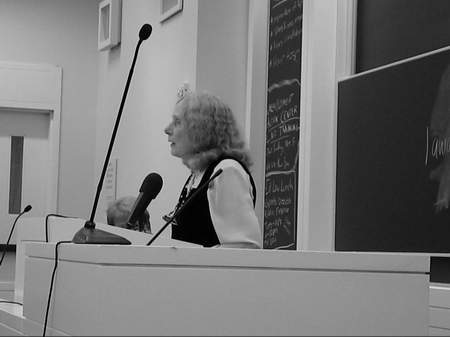
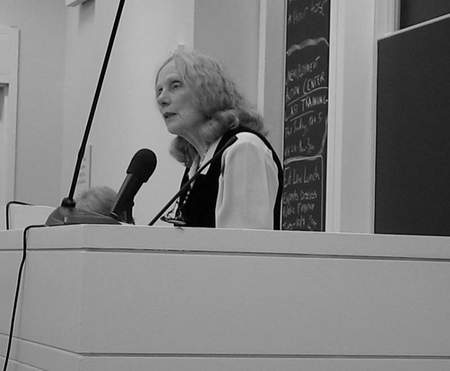
Luis Posada Carriles: A Tribunal
We hear a speech from Historian, Jane Franklin, she was among three speakers. Jane is a contributing editor to the Cuba Update, the journal of th eCenter Cuban Studies in New York City, since 1979. She is the author of two books: Cuban Foreign Relations 1959-1982 and Cuba and the United States: A Chronological History (Ocean Press, Melbourne, Australia) Jane has published numerous articles, poems and film reviews and has lectured extensively about Cuba, Vietnam, Nicaragua El Slavador and Panama.
We will be hearing from speakers Wayne Smith, Senior Fellow, Center for International Policy and Brian Becker, Director, A.N.S.W.E.R. Coalition in the weeks to come.
From the New York Daily News: “It took years, but he is finally going to be charged in the U.S. for his crimes – even if only symbolically. It will occur here, in New York, when a tribunal composed of scholars and human rights activists take up the case of international terrorist Luis Posada Carriles, a man who is responsible for a long list of murderous attacks.
Posada, though, is a very lucky man. Despite his dark history, Posada remains free to roam Miami’s sunny streets and happily lives at home with his family. His rap sheet is long and deadly. A convicted terrorist in two countries – he escaped Venezuela and was pardoned in Panama – Posada is considered the mastermind behind the 1976 bombing of Cubana Airlines Fight 455, which killed the 73 passengers on board, including the Cuban national fencing team. He is believed responsible for a string of hotel bombings in Cuba, resulting in the death of Italian tourist Fabio diCelmo. But these are only two examples of his treachery. Posada later boasted about the diCelmo killing in a New York Times interview, which should give everybody a clear idea of what kind of person this man is. Inexplicably, the Justice Department has refused to classify the former CIA operative as a terrorist. The reason may have to be found in Posada’s long and extensive ties with the CIA and several other nation’s intelligence agencies.”
——————————————————————————————-
Civil Liberties, Death Penalty, Guantanamo, Human Rights, Truth to Power
Podcast: Play in new window | Download
Updates:



Economics Professor Rick Wolff: The Capitalist Crisis
In this interview Professor Rick Wolff focuses on the larger issues beyond finance such as banking, money lending and credit, he says it was a problem in the making for the last 30 years. He describes historic underlying causes such as the end of the wage increase back in 1970. From 1820-1970 the American economy delivered a rising standard of living, wages went up every decade in that time and they used that money to buy more things.
In the last 30 years the wages in the United States did not go up. In order to keep buying things, people worked more hours and borrowed money, exhausting themselves in additional work and taking on more debt. From the workers point of view, there is increased anxiety and exhaustion, their lives are strained, pressurized. Meanwhile financial markets and banks compete with each other to profit from the workers’ massive debt.
Bail outs and extreme right anti-immigration moves will not solve underlying problem. A fundamental reorganization of the American economic system will not be done by the people who run the corporations, yet the change has to begin at the Board of Directors, the small groups of people heading corporations who have been making decisions in a classical way for 150 years.
Rick Wolff – Possible Solutions:
- Reorganize the way business works so that the people become there own board of directors.
- Corporations reorganized so that workers collectively become there own boss.
- Mon-Thurs – You come to work and do your job as you always did, less hours, wage increase.
- Friday – Attend meetings all day to assess the impact of the product on the community, what products to make, what to do with profits. Cultivating the community.
“This, instead of a handful of people, “the bosses” set against the employees in a conflicted situation that periodically makes each group behave in antagonistic ways in turn destroying the community – which is where we are now.”
Guest – Rick Wolff, Professor of Economics at University of Massachusetts at Amherst Rick teaches at the Brecht Forum and the New School in New York City. (Read Rick’s article, Economic Blues in the Monthly Review)
—

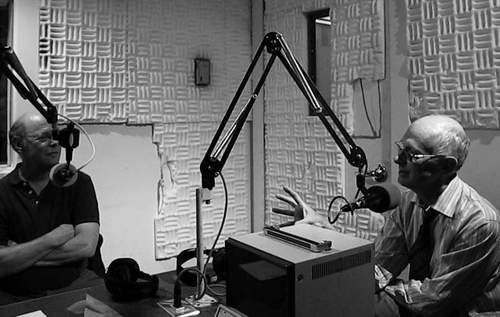
Economic and Political Analysis: Historic Financial Crisis and Bailout
Michael Smith and Michael Ratner host a lively discussion with economist Max Wolff and political science professor and author John Ehrenberg. Max Wolff begins with an anatomy of the financial collapses – “Low wage growth for majority of Americans, meanwhile global capacity for productive enterprise has skyrocketed and the way to make money is to find something to produce for very low wages. This creates a classic problem of insufficient aggregate demand. We can make it cheap, we can find this 11 year old in the rain forest to work in the factory for 39 cents an hour. Not successful if you can’t find a buyer. So, your success breeds a nightmare, the nightmare is resolved by international financial markets and growing debt.â€
In the last half hour John Ehrenberg joins in. He says the US needs a new New Deal, and though this is a dangerous time, it could be an opportunity for strong social movements. The Republican vetting of Palin is a major concern – “The sneering contemptuous disdain for serious thought or consideration for deliberation.†Faux populism that rewards capital and punishes labor and yet coming forward as a party for the common man.
Guest – Max Fraad Wolff , freelance researcher, strategist, and writer in the areas of international finance and macroeconomics. Max’s work can be seen at the Huffington Post, The AsiaTimes, Prudent Bear, SeekingAlpha and many other outlets.
Guest – John Ehrenberg, author of the book “Servants of Wealth: The Right’s Assault on Economic Justice.†A professor of political science at Long Island University, in this, his third book, critically analyzes the rise of an ideologically coherent Right. He dissects their themes of military weakness, moral decay, racial anxiety, and hostility to social welfare to reveal their central organizing objective of protecting wealth and assaulting equality.
—————————————————————————————
Civil Liberties, Human Rights, RFID, Supreme Court, Surveillance
Podcast: Play in new window | Download
Updates:

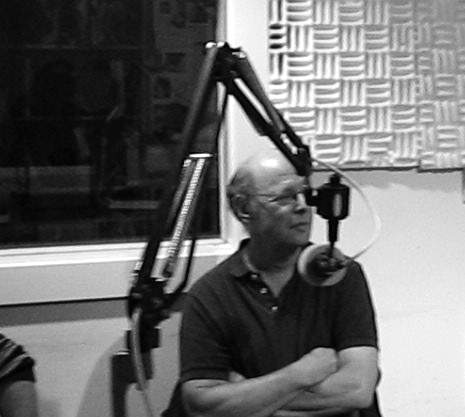

Lawyer’s You’ll Like: Rhonda Copelon
Attorney Rhonda Copelon is a professor at the Law School of the City University of New York and director of the school’s International Human Rights Law Clinic. Rhonda is also the Legal Advisor to the Women’s Caucus for Gender Justice.
From Article on New International Criminal Court: “The breadth and specificity of gender crimes in the court’s enabling statutes are directly attributable to a global caucus of women that formed in 1997 in the face of apathy and active resistance to prosecuting gender-based crimes. “Women made a huge difference,” said Rhonda Copeland, a professor at the Law School of the City University of New York and director of the school’s International Human Rights Law Clinic.
“They made it impossible to ignore that women have been left out of justice and that we have to be in it,” Copelon said. “If there were nobody there saying ‘this is violence,’ I don’t know how it would have happened.”Rhonda shares with listeners, her history of fighting for the constitutionality of the abortion cases in New York City and its effect on poor women in a pre-Roe v Wade climate. She also discuss the Harlem 6 case. This is the first part of the interview with Rhonda Copelon.
—


Bill Would Let Insurers Track Where, When, How You Drive
A bill proposed by the California legislature would allow insurance companies to install black boxes on vehicles that track milage but also measure more sensitive information such as how aggressive you drive. The bill is structured so that insurance companies can encourage people to drive less with lower insurance. Consumer watchdogs say drivers shouldn’t have to choose between fair insurance rates and protecting their privacy when there are less intrusive ways to collect data.
Under the proposed bill titled AB 2800, the “black box†would allow insurance companies to track how fast drivers accelerate, where motorists go and which neighborhoods they drive through. The device would also monitor whether they come to a full stop at a stop sign; and when they apply their brakes. Privacy protection groups are also watching as similar proposals are being introduced in other states.
Guest – Carmen Balber, Consumer Advocate with Consumerwatchdog.org
—


Bush Proposes To Bypass Endangered Species Act Experts
Currently under the Endangered Species Act, federal agencies are required to consult with federal wildlife experts to make sure activities such as mining, logging and road construction do not threaten endangered species. Now, the Bush administration has proposed a new plan that will give federal agencies the decision of whether they want expert consultation to determine if activities will affect endangered species.
Thousands of these consultations happen each year and federal wildlife experts have finely tuned their knowledge of protecting endangered species in the last twenty years. Critics say the proposal is a disturbing reversal.
Guest – Joel Kupferman, executive director and head attorney of the New York Environmental Law and Justice Project
—————————————————————————————–
Civil Liberties, Criminalizing Dissent, Impeachment, Iraq War, Truth to Power
Podcast: Play in new window | Download
Updates:
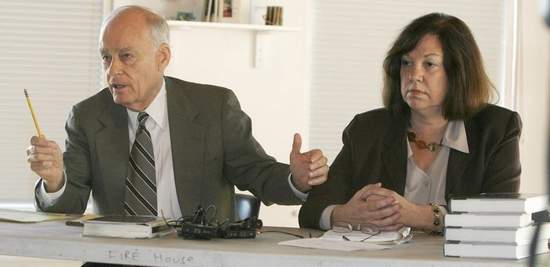
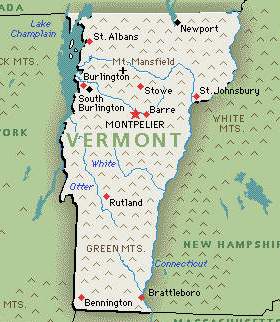
David Swanson: Vermont AG Candidate Backs Prosecution of President Bush for Murder
Hosts Michael Ratner and Michael Smith check back with journalist David Swanson about the War Crimes Conference. David was at the conference, there was a great turnout at the event and thousands viewed online. One strategy in The Prosecution of George W. Bush for Murder is to establish jurisdiction in the cases for Attorney Generals in each state and also the approximately 900 district attorneys in the counties of those states.
Bugliosi says it’s not unreasonable to believe that at least one prosecutor will be courageous enough to step up. She did, her name is Charlotte Dennett, Progressive Party candidate for Vermont attorney general. Dennett says if elected she would prosecute Bush for murder, appoint Bugliosi as a special prosecutor to hold Bush accountable for deaths stemming for the Iraq war.
How to make a citizen’s arrest of a war criminal.
Guest – David Swanson, creator of many media-based websites including ConvictBushCheney.org he has worked as a newspaper reporter and as a communications director, with jobs including press secretary for Dennis Kucinich’s 2004 presidential campaign.
–


Economic and Political Analysis: Historic Financial Crisis and Bailout
Michael Smith and Michael Ratner host a lively discussion with economist Max Wolff and political science professor and author John Ehrenberg. Max Wolff begins with an anatomy of the financial collapses – “Low wage growth for majority of Americans, meanwhile global capacity for productive enterprise has skyrocketed and the way to make money is to find something to produce for very low wages. This creates a classic problem of insufficient aggregate demand. We can make it cheap, we can find this 11 year old in the rain forest to work in the factory for 39 cents an hour. Not successful if you can’t find a buyer. So, your success breeds a nightmare, the nightmare is resolved by international financial markets and growing debt.”
In the last half hour John Ehrenberg joins in. He says the US needs a new New Deal, and though this is a dangerous time, it could be an opportunity for strong social movements. The Republican vetting of Palin is a major concern – “The sneering contemptuous disdain for serious thought or consideration for deliberation.” Faux populism that rewards capital and punishes labor and yet coming forward as a party for the common man.
Guest – Max Fraad Wolff , freelance researcher, strategist, and writer in the areas of international finance and macroeconomics. Max’s work can be seen at the Huffington Post, The AsiaTimes, Prudent Bear, SeekingAlpha and many other outlets.
Guest – John Ehrenberg, author of the book “Servants of Wealth: The Right’s Assault on Economic Justice.†A professor of political science at Long Island University, in this, his third book, critically analyzes the rise of an ideologically coherent Right. He dissects their themes of military weakness, moral decay, racial anxiety, and hostility to social welfare to reveal their central organizing objective of protecting wealth and assaulting equality.
—————————————————————————————————–








